Tuesday Feb 17, 2026
Tuesday Feb 17, 2026
Friday, 22 May 2020 00:00 - - {{hitsCtrl.values.hits}}
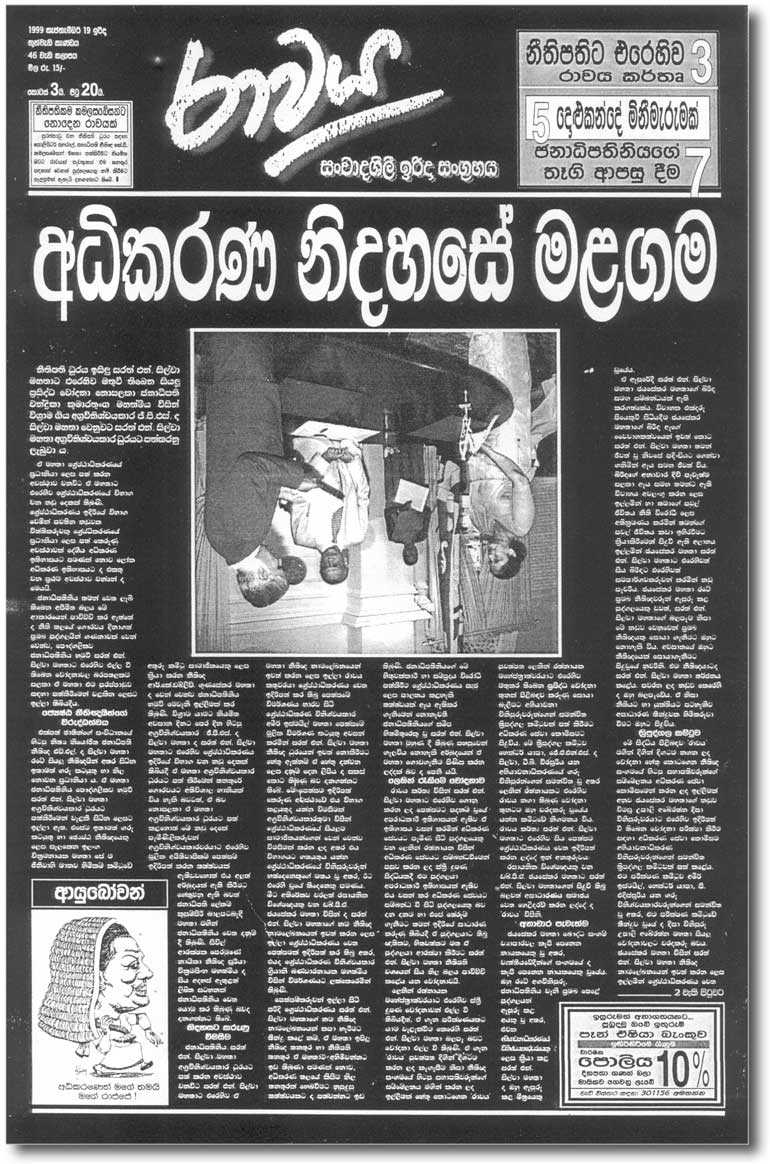
A heaty dialogue appears to have been generated on social media over two letters that I had addressed to the Ravaya staff recently, suggesting to them the desirability of liquidating Ravaya in the present  context of the coronavirus pandemic Sri Lanka is facing rather than continuing the publication and avoid disastrous financial consequences that might arise if we were to continue under trying conditions.
context of the coronavirus pandemic Sri Lanka is facing rather than continuing the publication and avoid disastrous financial consequences that might arise if we were to continue under trying conditions.
Ravaya being a unique experiment made by me in the field of journalism providing a radical platform to discuss controversial and sensational issues, I felt it is appropriate, at this juncture, to publish a brief account of my observations which I had communicated to the Ravaya staff and highlight major experiments I have made with Ravaya over the last 33 years for the benefit of journalists as well as the Ravaya readers.
The State of Sri Lanka and its institutional system and the political system of Sri Lanka and its social system have been the major focus of my interest and investigation for a very long time. One major observation I have made after the internal civil war was over was that the State and the sociopolitical system of Sri Lanka would inevitably suffer a serious decline, plunging the country into anarchy unless immediate measures were taken to introduce structural reforms leading to a formal recreation of the State and the socio-political system. I reached this horrific conclusion taking the following reasons into consideration.
The process in which Sri Lanka gained independence.
The decline of the State in the face of growing distortions in the social system caused by the failure to recreate the modern nation state, intensification of ethnic, caste and religious differences and Sinhala-Tamil insurrections that arose as a result thereof and the great damage caused to the State by them.
The enormity of corruption involving the entire system of State institutions caused by the exploitation of public property by the rulers, which had become a regular feature of State administration since 1978.
I made a great effort to make the rulers of the country aware of the possibility of the country falling into an anarchic situation and the importance of introducing structural reforms to arrest the trend; but the political gentry lacked the wisdom or discipline needed to understand it.
Having failed in this endeavour I ventured to write a book on this issue, titled ‘Lankava Galawaganima’ –‘Rescuing Sri Lanka,’ in 2011. The main object of the book was to educate the public about the impending catastrophic disasters that Sri Lanka was going to face.
Crisis and the pandemic
I did not foresee the pandemic in advance. Yet, it broke out when the sociopolitical system of Sri Lanka had reached its peak. The outbreak of the pandemic on top of the crisis Sri Lanka was already facing led to haste and accelerated the declining process of the sociopolitical system. 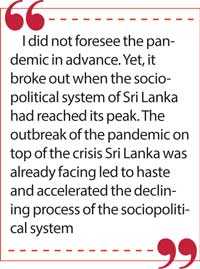
In my second article written after the victory of Gotabaya Rajapakse, I said that the country that President Gotabaya had been offered to govern was not in good shape and easy to govern, but an extremely rotten and corrupt one. The pandemic can be said to have raised the crisis of Sri Lanka to its maximum.
Needless to reiterate that right now Sri Lanka is not in a position to sustain business ventures. This situation has impacted not only the large businesses but also small ventures like Ravaya. In many other countries, businessmen are encouraged to run their businesses with 60% of employee’s wage bill being paid by the Government. Sri Lanka cannot afford to maintain such a system. Sri Lanka wants businessmen to run their businesses with a minimum wage of Rs. 14,500 being paid to their employees.
Needless to say, that is not the solution to the problem. The survival of private businesses is determined by cost and income. A policy that demands continued spending without a corresponding income will inevitably create an environment which will destroy the survival of business. Such a policy might even create a situation that could wreak havoc on the private business sector of the country.
In April, Ravaya paid its employees 80% of their salary without having any income generated. Such a system cannot last long. Perhaps, the final outcome of this can be that the Ravaya might even become bankrupt so that the payment of gratuity and compensation to staff which is their due would not be possible.
The role of Ravaya
My main objective in founding Ravaya was to establish a visionary, fearless and investigative media tradition different from other newspapers, and focus its main attention on social benefit. In countries 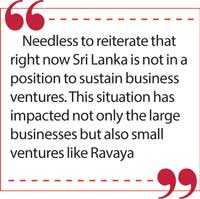 where a strong democratic tradition prevails, it is enough to point out a grave error happening in the country. There is no need to fight or exert extra effort to enforce law against such incidents. But the way things happen in Sri Lanka is quite different.
where a strong democratic tradition prevails, it is enough to point out a grave error happening in the country. There is no need to fight or exert extra effort to enforce law against such incidents. But the way things happen in Sri Lanka is quite different.
In Sri Lanka, reporting a serious offence alone is not adequate for it to be corrected.The prevailing reality in Sri Lanka is that the offences are not corrected and they are left to be fossilised if the culprits are powerful and at the receiving end of the patronage of the ruling party.
In this backdrop, it was my intention to found a newspaper that would not restrict its role to good reporting only, but one that would continue to fight for enforcement of law against wrongdoers, if not in all cases, at least important ones. During my tenure, I must admit that it was possible for me to experiment on many things and achieve successful results in most cases.
The Parliamentary Privilege Act can be regarded as a law which has caused a great deal of distress to journalists in Sri Lanka. The ruling party used this legislation to silence those who write criticising parliamentarians and ministers. The journalists who were sued under this Act were compelled to adopt a policy in which they were forced to go before the Privileges Committee, admit the offence, plead guilty and ask for clemency if they were to avoid imprisonment and thereafter to keep away from writing about whatever the wrong that they observe.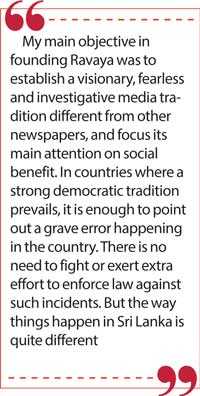
There were five privilege cases filed against me. Unlike others, I adopted a different policy in this instance. That was to challenge the legality of the Parliamentary Privilege Act. Although there was a Parliamentary Privilege Act, the Privilege Committee did not have the jurisdiction to prosecute and punish those accused under the Act. Until then, the Parliamentary Privileges Committee had punished journalists which was in violation of the law. Having realised this loophole and the injustice done, I challenged the privilege law itself.
Several reputed international institutions, including the World Bank, supported my cause. Paskaralingam, the then Chief Secretary to the Treasury, told me later that President Premadasa was surprised to witness the support extended to me by the international institutions in this struggle. It is interesting to note that not only did I win this battle, but the Parliament was also compelled to abandon the process of prosecuting journalists by the Parliamentary Privilege Committee.
Against criminal defamation law
Prosecution of journalists under criminal defamation law by the Attorney General had been a major challenge faced by me and the other journalists. This law was used not only against me but also against several other journalists like Sunil Madawa Premathilaka, Sinha Ratnatunga, Lasantha Wickremetunge and Bandula Pathmakumara. They all fought for their defence being within the law. Yet, the path chosen by me was different.
There were 11 cases filed against me under the criminal defamation law. I had to spend half my professional time on Court cases.There I opted to choose a path different from what my professional colleagues had adopted. I was determined to challenge the legality of the criminal defamation law. It was the Attorney General who had the discretionary power to prosecute under the criminal defamation law which he often misused and exercised against the law.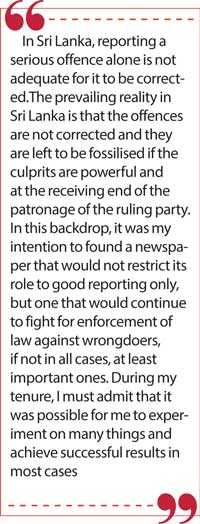
My legal battle against criminal defamation law became a protracted struggle. I had to go to the Court of Appeal first, challenging the cases filed against me by the Attorney General, and then to the Supreme Court, taking all the appeals in one lot and at last to the Human Rights Committee of Geneva which has been established under the Civil and Political Rights Charter of the UN when all my efforts failed in seeking justice from the Court of Appeal and the Supreme Court of Sri Lanka.
Eventually this legal battle ended with the Human Rights Committee of Geneva deciding the case in my favour and finding the Government of Sri Lanka was at fault. The Government of Sri Lanka was ordered to pay me compensation for the long-term oppression inflicted on me by prosecuting me contrary to the law.Yet, so far it has not been paid; and I must mention that I have not followed a policy of going behind the rulers and pleading for the compensation.
In addition to major struggles outlined above, among many other instances, I had to go beyond the general media framework and fight strongly to ensure that justice was done for innocent, ordinary people who had been subjected to grave injustices. The incidents involving Lekha, Chandralekha and two women who were raped by Magistrate Lenin Ratnayake are a few examples of this.
Of all the battles, the most powerful struggle I made at that time was the one against Sarath Nanda Silva when he held the post of Attorney General and later, after he was appointed the Chief Justice. The disgraceful role he played as Chief Justice has had a devastating impact not only on the Judiciary but also on the entire country. Although my legal battle against him almost throttled him, President Chandrika intervened and rescued him using presidential power.
When President Chandrika appointed him the Chief Justice, I was compelled to protest his appointment by turning the picture of his swearing-in before the President upside down and publishing it as a black issue under the caption ‘Adhikaranaye Malagam – demise of the Judiciary”. I have never heard of similar reporting anywhere in the world before.
Thereafter, I and several others filed a case against him before the Supreme Court, which was headed by him, challenging his appointment. It became a case of great international interest and the International Bar Association sent a retired Chief Justice of Kerala, India, to Sri Lanka to observe the hearing of the case. 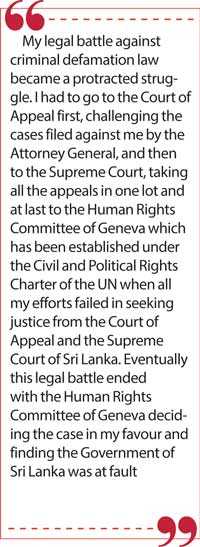
If the media institutions in Sri Lanka had come forward to support me in this case rather than standing aloof, not only may I have won the case, but it would have also changed the course of the Judiciary as well as that of the country. Instead, some owners of media institutions in the country followed a policy of safeguarding this corrupt Chief Justice to the maximum and used his influence to get the Court cases against their institutions resolved to their advantage.
Non-engagement in combating grave injustices to individuals and society, not all, at least in selective issues of symbolic importance, and failure to tread away from the customary journalistic frame to achieve this need and obtain justice can be considered the main reason that weakened and undermined Ravaya’s social acceptance in the recent past.